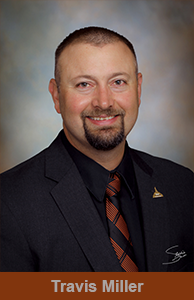 As an educator and as a Nebraskan, I'm excited about the development of the Buffett Early Childhood Institute at the University of Nebraska. I'm motivated by the Institute’s vision to “make Nebraska the best place in the nation to be a baby.” I want my community to be a part of that vision so that Bayard can become one of the best places in the nation to be a baby, and also one of the best places in the nation to be a parent. I believe parents in every community in this state would like to see that vision for our state come to fruition.
As an educator and as a Nebraskan, I'm excited about the development of the Buffett Early Childhood Institute at the University of Nebraska. I'm motivated by the Institute’s vision to “make Nebraska the best place in the nation to be a baby.” I want my community to be a part of that vision so that Bayard can become one of the best places in the nation to be a baby, and also one of the best places in the nation to be a parent. I believe parents in every community in this state would like to see that vision for our state come to fruition.
To work to bring that vision to rural Nebraska, the 21 school districts in Educational Service Unit #13, along with the Panhandle Partnership for Health and Human Services, are engaged in initial conversations with the Buffett Early Childhood Institute to investigate possibilities for partnering and collaborating to achieve our common interest in improving early childhood in our communities.
Our school is looking forward to developing additional leadership capacity to serve families with children under age 3. After attending a panel discussion, “50 Years After Head Start: Making an Investment in Early Childhood Education in America,” that was recently provided by the Aspen Institute and the Buffett Early Childhood Institute, I am more convinced than ever that rural communities need increased leadership to promote quality experiences for children in their earliest years. Investments in our children at early ages provide significant returns to our communities and our state. This is one of the most important messages that First Five Nebraska continues to share across our great state.
Supportive, Engaged Parents
As the superintendent of schools, I have the opportunity to work with a community of positive, supportive and engaged parents. I believe that’s the case in most, if not all, rural communities in Nebraska. In rural communities there are many advantages for children such as access to green space, clean air, close-knit family or community ties and the opportunity to develop strong relationships with peers and adults when going through school.
That is the great news. The not-so-great news is that we know we have much progress that still needs to be made to provide quality early learning opportunities in our community. Access to such basic services as health care can be a major challenge in rural communities. It’s common for parents to have to travel great distances to have their children seen by a pediatrician. In my community, it’s a 46-mile (round trip) journey to the nearest pediatricians’ clinic. For families with limited resources, the distance between home and the hospital can be a significant barrier to accessible and affordable care. Mental health care can be even more challenging to access.
There is a need for rural development of systems for families with young children. It would be beneficial to enhance systems providing information, support and networking so that families have access to the resources they need to provide a great start to the lives of their children.
In rural Nebraska poverty is a significant challenge for families and communities. In our school district (and the entire ESU#13 region), a majority of our students qualify for free or reduced price meals through the school lunch program.
Regional Collaboration Needed
Mobility is a way of life for many of our students. It’s not uncommon for families to move several times during a school year. More than one in seven children in our school district moved into or out of our school district during the 2013-2014 school year. More than one in 12 of our students during the same year were considered to be “highly mobile.” Given that our families are so mobile, I believe that support to families needs to be provided through regional collaboration rather than by isolated organizations. Access to quality early childhood education should not depend on the resources of individual school districts. Providing a cohesive approach at the regional level is the only way schools and communities are going to make a difference for all Nebraska families, especially for those who move regularly .
Travis Miller
Superintendent, Bayard Public Schools


